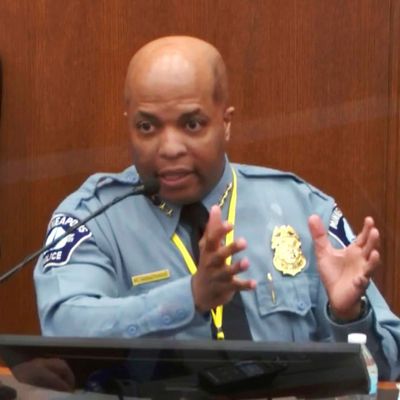
A verdict is still weeks away, but a lot has already happened in one of the most closely watched trials in recent American history. I spoke with Intelligencer fellow Nia Prater, who has tracked the case against Derek Chauvin, about the latest developments out of Minnesota.
Ben: The trial of Derek Chauvin, who is accused of killing George Floyd, has been ongoing for more than a week, and is expected to last about three more. So far, it has been full of harrowing, emotional testimony from the prosecution, including Floyd’s girlfriend, the convenience-store employee who called the police on him in the first place, the 18-year-old who filmed the viral video of Chauvin kneeling on Floyd, and others. What has stood out to you about the proceedings so far?
Nia: Something that I found particularly notable is the number of officials from the Minneapolis Police Department that have come forward to testify in this trial, many of them current employees. The current police chief, Medaria Arradondo, just spoke a few days ago and was pretty critical of Chauvin’s actions. The head of the department’s homicide unit also testified and called Chauvin’s use of force “totally unnecessary.” That’s pretty unusual in these sorts of cases involving police officers.
Ben: The prosecution’s argument is quite clear: Chauvin directly caused Floyd’s death. Is the defense allowing that he did use excessive force, but that the drugs in Floyd’s system were the real cause of death? Or are they denying any real wrongdoing at all?
Nia: The defense maintains that what Chauvin did was largely in line with what he was taught and that it was what the situation called for. Like I mentioned earlier, a lot of the prosecution’s witnesses are current officers with the MPD, and a major focus of their questioning was on officer training and department policy on uses of force. The prosecution is trying to push back on the defense’s argument, to show that the actions Chauvin took were out of line and wrong by the department’s own standards and citing working officers to prove that.
Ben: Chauvin is facing three charges: second degree unintentional felony murder, third degree murder, and second degree manslaughter. In none of these cases would the prosecution have to prove that Chauvin acted to cause Floyd’s death intentionally, right?
Nia: Right, none of these charges require proof of intent. The most serious charge would be second-degree unintentional murder, and it requires the prosecution to prove “beyond a reasonable doubt” that Chauvin’s actions caused George Floyd’s death. Something that’s interesting is that, initially, the third-degree murder charge against Chauvin was dropped, but was later re-added due in part to a new precedent that was set in another case involving a Minneapolis police officer. (Former officer Mohamed Noor was found guilty of third degree murder in the death of Justine Ruszczyk Damond in 2017. The state Court of Appeals upheld the conviction.)
Ben: As in any high-profile case, a lot of time was spent selecting a jury that was agreeable enough to both the prosecution and defense. Looking at its makeup, do you think it reflects a particular advantage for either side?
Nia: It’s hard to say. Fifteen people were chosen, 12 for the actual jury and three alternates. Their ages range from their 20s to their 60s. The jury has nine white members compared to six members of color. But, as Vox has previously pointed out, this is still more diverse than both Minneapolis as a city and Hennepin County as a whole statistically. (Census data shows that Hennepin County is 74 percent white and 14 percent Black, and Minneapolis is about 64 percent white and 19 percent Black.)
Ben: Even though cops are rarely convicted of crimes in these sorts of cases, Chauvin faces a unique set of circumstances. The video of him kneeling on George Floyd is infamous; police departments around the country condemned him; and, as you said, he’s facing strong criticism even from his own department and other voices, like a use-of-force expert who said what he did was excessive and deadly. Is there a sense that the defense has an impossible job here, or is that overly naïve about how trials of police officers operate?
Nia: I think that with a case like this, you can never be 100 percent certain about the outcome. There have been past cases where video footage of the incident played a huge role, but ultimately didn’t result in a conviction or even an indictment, like with Eric Garner. Clearly the bystander video of George Floyd is a significant piece of evidence and the defense is ultimately trying to prove that there’s more to the situation than what the video shows. They’ve been focused on Floyd’s health, and the fact that autopsy found drugs in his system. Just looking at anything that could point to something else being the cause of Floyd’s death other than Chauvin’s actions.





























